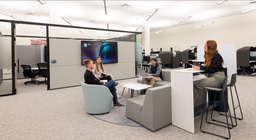Sustainability in AV, AI in AV, Conferencing & Collaboration, Broadcast AV, Command and Control, and 2 more
UX Design for AV
In today’s AV industry, the success of a system isn’t just measured by how advanced the technology is—but by how intuitive and effective it is for the end user.

1. Adopt a Human-Centered Design Process
User Design Thinking or User-Centered Design (UCD) frameworks in AV project workflows:
| Phase | What to Do ? |
|---|---|
| Empathize | Interview users (operators, presenters, tech staff) to learn their pain points. |
| Define | Create user personas and map their AV usage journey. |
| Ideate | Brainstorm AV workflows based on real-life needs. |
| Prototype | Design UI mockups for touch panels or control apps. |
| Test | Let users interact with the system before finalizing deployment. |
2. Focus on Use Cases Over Equipment
Instead of starting with "which projector or matrix switcher?",
Ask: “What does the user want to do — present wirelessly, join a Zoom call, or share content in a hybrid meeting?”
Build systems and interfaces around user tasks, not devices.
3. Design Simplified & Predictable Interfaces
For Touch panels / Apps:
-
Use consistent icons (mute, power, source select).
-
Minimize screens — no more than 3 taps to any function.
-
Show system feedback (e.g., volume bar, source status).
-
Provide room status indicators (e.g., “Meeting in Progress”).
Use visual hierarchy:
-
Big buttons for common actions.
-
Group related functions (lighting, AV, shades).
4. Implement Real-World UX Feedback Loops
-
Schedule a post-install walkthrough with users.
-
Gather feedback after 1 week, 1 month, 3 months.
-
Install QR codes on AV racks or touch panels linking to short feedback forms or video tutorials.
5. Train AV Teams in UX Basics
Introduce your designers, engineers, and sales teams to:
-
UX/UI basics (e.g., via Coursera, UX Design Institute)
-
AVIXA’s CTS-D and CTS-I include elements of UX
-
Tools like Figma, Adobe XD, or Touch panel design standards (Crestron/Extron/AMX GUI guidelines)
6. Simulate User Scenarios During Testing
Before handover:
-
Create test scenarios: "Teacher walks into class, wants to show a YouTube video."
-
Ask: How many steps does it take? Is it obvious?
-
Let non-technical users test systems.
7. Measure UX with KPIs
Use UX metrics in commissioning reports:
-
First-time user success rate.
-
Time-to-operate common tasks.
-
Error recovery ease.
-
Number of support calls in the first 30 days.
8. Use Mobile & BYOD-Friendly Control
Design interfaces that work smoothly on:
-
Phones
-
Tablets
-
Laptops
Let users control AV from their own devices using QR-code-based login or web control.
9. Standardize Modular UX Templates
Create templates for:
-
Meeting rooms
-
Classrooms
-
Auditoriums
But allow some flexibility for branding and unique user needs.
10. Showcase UX Wins in Your Portfolio
Document:
-
Before/after interface shots
-
Client testimonials
-
Measurable improvements in user adoption
This builds credibility and helps shift the AV culture from “boxes and wires” to “people and experience.”
By applying UX design to AV:
-
Users are happier and more confident.
-
Support calls decrease.
-
Systems are adopted faster.
-
AV becomes an invisible enabler, not a hurdle.
-
Xchange Advocates are recognized AV/IT industry thought leaders and influencers. We invite you to connect with them and follow their activity across the community as they offer valuable insights and expertise while advocating for and building awareness of the AV industry.
Recommended Content
Immersive Experiences, AI in AV, Technology Managers' Forum, AVIXA Systems Integrators Council , IT and Networked AV, Xchange Community Chat, APAC Member Forum, AV/IT Buyers, Xchange Advocate Room, AV Foodies
LetsTalkAVbyAlexis Series: Episode 5:The Most Repeated Mistake in AV Projects: Treating AV as Equipment, Not a System






Please sign in or register for FREE
If you are a registered user on AVIXA Xchange, please sign in